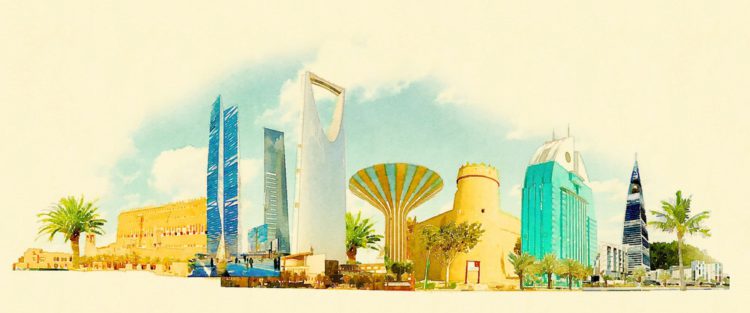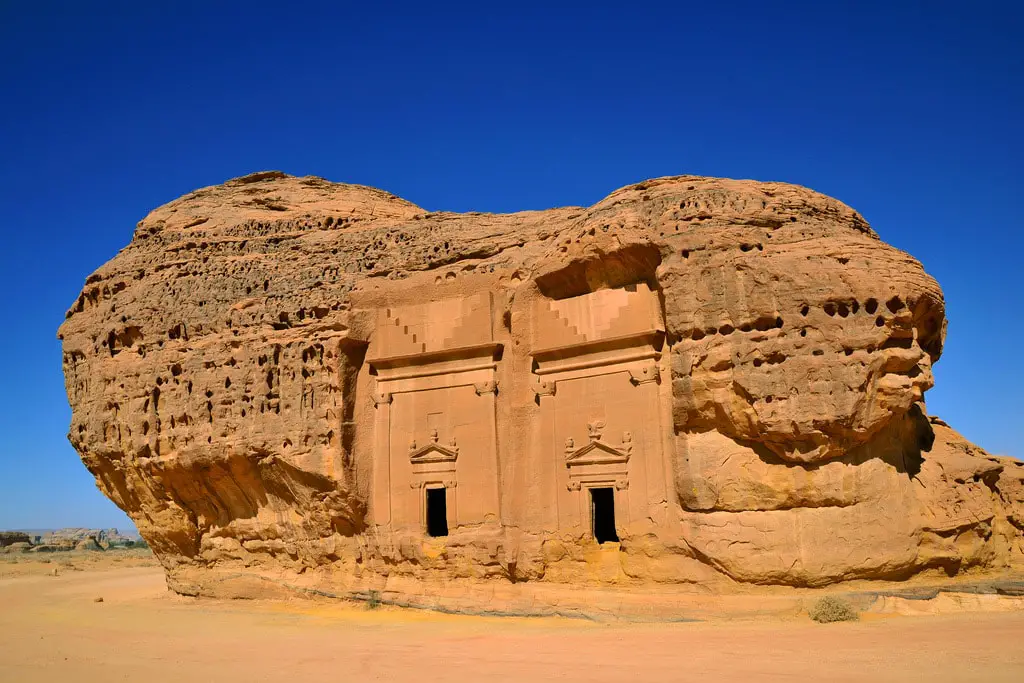Saudi Arabia is a land of rich history and cultural heritage, home to some of the world’s most fascinating monuments that tell the story of its ancient civilizations, Islamic heritage, and rapid modernization. From the awe-inspiring Nabatean tombs of Madain Saleh, the first UNESCO World Heritage Site in the country, to the majestic Abraj Al Bait Clock Tower in Mecca, which stands as one of the tallest buildings in the world, these landmarks reflect the kingdom’s diverse past and ambitious future. The historical city of Diriyah, the birthplace of the Saudi state, showcases the architectural beauty of mudbrick structures that once housed the royal family, while the King Fahd Fountain in Jeddah remains the tallest of its kind, symbolizing the nation’s grandeur. Rock art sites in Hail, dating back thousands of years, provide a glimpse into the lives of early inhabitants, while modern wonders like the futuristic King Abdullah Financial District redefine the urban skyline. Whether ancient or contemporary, Saudi Arabia’s monuments serve as enduring symbols of its rich cultural identity, deep-rooted traditions, and dynamic progress.
This article explores the most iconic Saudi Arabia monuments, their historical significance, and travel information.

Ancient Monuments
Saudi Arabia is home to numerous ancient monuments that offer a glimpse into its rich and diverse history, dating back thousands of years. Among the most notable is Madain Saleh (Al-Hijr), a UNESCO World Heritage Site featuring well-preserved Nabatean tombs carved into sandstone cliffs, similar to Petra in Jordan. The rock art of Hail, with petroglyphs and inscriptions over 10,000 years old, provides valuable insights into prehistoric life in the Arabian Peninsula. The ancient city of Diriyah, once the capital of the first Saudi state, boasts traditional mudbrick architecture and historical sites like At-Turaif, a symbol of the kingdom’s early heritage. Additionally, the mysterious Rajajil Standing Stones in Al-Jouf, often referred to as the "Stonehenge of Arabia," remain an enigma, believed to be linked to an ancient civilization’s rituals or astronomical purposes. These ancient monuments not only reflect Saudi Arabia’s deep historical roots but also highlight its significance as a crossroads of early human civilization, trade, and culture.
1. Al-Hijr (Madain Salih)
Al-Hijr, also known as Madain Salih, is one of the most remarkable ancient sites in Saudi Arabia. It was once a thriving Nabatean city, similar to Petra in Jordan.
-
Location: AlUla, Saudi Arabia
-
Historical Significance:
-
A UNESCO World Heritage Site
-
Former Nabatean city with well-preserved tombs
-
Known as the "Second Petra" of Arabia
-
-
Key Features:
-
Over 100 monumental tombs
-
Well-preserved rock inscriptions
-
Ancient water wells
-
2. Diriyah – At-Turaif District
Diriyah, particularly the At-Turaif district, is a crucial historical site in Saudi Arabia. It is considered the birthplace of the Saudi state and served as the first capital of the Saudi dynasty.
-
Location: Near Riyadh
-
Historical Significance:
-
Birthplace of the Saudi state
-
UNESCO World Heritage Site
-
Former seat of the first Saudi dynasty
-
-
Key Features:
-
Traditional Najdi architecture
-
Mudbrick palaces
-
Museums and heritage centers
-
3. Jubbah Rock Art
Jubbah Rock Art is a testament to early human civilization in the Arabian Peninsula. It features petroglyphs dating back thousands of years.
-
Location: Hail Region
-
Historical Significance:
-
One of the oldest rock art sites in Arabia
-
UNESCO-listed site
-
Dates back over 10,000 years
-
-
Key Features:
-
Ancient petroglyphs depicting animals and humans
-
Inscriptions in Thamudic script
-
Archaeological importance
-
Islamic Monuments
4. Masjid al-Haram & Kaaba
Masjid al-Haram is the holiest site in Islam and home to the Kaaba, the most sacred structure in the religion. Millions of Muslims visit it annually for Hajj and Umrah pilgrimages.
-
Location: Mecca
-
Religious Significance:
-
Holiest site in Islam
-
Destination of the Hajj pilgrimage
-
Home to the Kaaba, the Qibla for Muslim prayers
-
-
Key Features:
-
Largest mosque in the world
-
Black Stone and Zamzam Well
-
Annual Hajj pilgrimage site
-
5. Al-Masjid an-Nabawi
Al-Masjid an-Nabawi, located in Medina, is the second holiest mosque in Islam. It holds great religious significance as it houses the tomb of Prophet Muhammad (PBUH).
-
Location: Medina
-
Religious Significance:
-
Burial site of Prophet Muhammad (PBUH)
-
Second holiest mosque in Islam
-
A place of pilgrimage
-
-
Key Features:
-
Green Dome housing Prophet Muhammad’s tomb
-
Expansive prayer halls
-
Open courtyard with retractable umbrellas
-
Modern Landmarks
6. Kingdom Centre Tower
The Kingdom Centre Tower is one of the most recognizable skyscrapers in Riyadh. It stands as a symbol of Saudi Arabia’s modern development and economic strength.
-
Location: Riyadh
-
Architectural Significance:
-
One of the tallest buildings in Saudi Arabia
-
Features a distinctive sky bridge
-
Symbol of Riyadh’s modern development
-
-
Key Features:
-
Shopping mall and luxury hotel
-
Sky bridge offering panoramic city views
-
Award-winning contemporary design
-
7. Jeddah Tower (Under Construction)
Jeddah Tower, upon completion, is expected to be the tallest building in the world. It will redefine Jeddah’s skyline and mark a new era of Saudi Arabia’s economic ambitions.
-
Location: Jeddah
-
Significance:
-
Expected to be the world’s tallest building
-
A key element in Jeddah’s modernization
-
Part of the Jeddah Economic City project
-
-
Key Features:
-
Over 1,000 meters in height
-
Observation decks with 360-degree views
-
Ultra-modern architectural style
-

Cultural and Historical Museums
8. National Museum of Saudi Arabia
The National Museum of Saudi Arabia in Riyadh offers visitors a deep dive into the kingdom’s history, from prehistoric fossils to Islamic artifacts.
-
Location: Riyadh
-
Cultural Significance:
-
Showcases Saudi Arabia’s history and heritage
-
Interactive exhibits and ancient artifacts
-
Part of King Abdulaziz Historical Center
-
-
Key Features:
-
Fossils, manuscripts, and artifacts
-
Interactive historical displays
-
Sections dedicated to Islamic and Arabian history
-
9. Al Tayebat International City Museum
Al Tayebat Museum in Jeddah is a hidden gem showcasing Saudi Arabia’s diverse cultural and historical heritage. It provides a glimpse into traditional Hijazi architecture and ancient artifacts.
-
Location: Jeddah
-
Cultural Significance:
-
Highlights Jeddah’s history and Arabian heritage
-
Houses diverse artifacts, including Islamic relics
-
A must-visit for history enthusiasts
-
-
Key Features:
-
Traditional Hijazi architecture
-
Over 300 rooms with exhibits
-
Collections from different Islamic periods
-
Table: Overview of Saudi Arabia Monuments
|
Monument Name |
Location |
Significance |
|---|---|---|
|
Al-Hijr (Madain Salih) |
AlUla |
Nabatean city, UNESCO site |
|
Diriyah – At-Turaif |
Near Riyadh |
Birthplace of Saudi state |
|
Jubbah Rock Art |
Hail Region |
Ancient petroglyphs |
|
Masjid al-Haram & Kaaba |
Mecca |
Holiest Islamic site |
|
Al-Masjid an-Nabawi |
Medina |
Burial site of Prophet Muhammad |
|
Kingdom Centre Tower |
Riyadh |
Modern architectural marvel |
|
Jeddah Tower |
Jeddah |
Future world’s tallest building |
|
National Museum of Saudi Arabia |
Riyadh |
Showcasing Saudi history |
|
Al Tayebat Museum |
Jeddah |
Traditional and Islamic heritage |
Saudi Arabia’s monuments reflect its rich cultural heritage, Islamic traditions, and modern architectural prowess. Whether you are interested in exploring prehistoric rock art or experiencing the grandeur of Islamic landmarks, Saudi Arabia offers a remarkable journey through time.





.gif)














Sign in
to continue to ilmkidunya.com